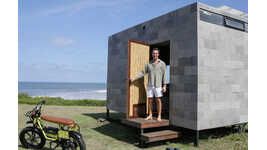The city of Portland, Oregon, is welcoming the concept of tiny homes with its Miniature Housing Project. The Miniature Housing Project is a campaign wherein miniature homes will be constructed to provide accommodation for the vagrant. This construction will be carried out on public land and will be open to low-income residents.
The project is a move towards equality for the homeless. Multnomah County Chairwoman Deborah Kafoury explained, "Before people can get back on their feet and take advantage of job training and drug and alcohol counseling, they need a place to live.This helps accomplish that."
So far, the results have been encouraging. Other cities like Wisconsin, New York and Texas which are facing the same problem have been inspired by the strategy, which leaves residents worry-free about accommodation. Betty Ybarra, a formerly destitute woman from Wisconsin, has benefited from the Miniature Housing Project herself. "It's exciting. I've never owned my own house," she told NBC.
The entire strategy is a collaboration between Micro Community Concepts, an NGO and TechDwell, a company exclusively working on micro-home designs. It is inclusive of 25 housing units, and covers laundry, administrative services and other amenities present on-site. The rent for Miniature Housing Project homes is estimated at $250 to $350 per month for rent.
Revolutionary Micro-Home Initiatives
The Miniature Housing Project of Portland is Making Waves
Trend Themes
1. Micro-home Revolution - The Miniature Housing Project in Portland is a revolutionary initiative that aims to provide affordable housing solutions for the homeless and low-income residents through the construction of tiny homes on public land.
2. Equality Through Housing - The Miniature Housing Project represents a disruptive innovation opportunity to address the issue of homelessness and promote equality by giving people a place to live and access essential services that can help them rebuild their lives.
3. Inspiration for Other Cities - The success of the Miniature Housing Project has inspired other cities, such as Wisconsin, New York, and Texas, to explore similar strategies for tackling homelessness and providing worry-free accommodation to those in need.
Industry Implications
1. Nonprofit Organizations - The Micro Community Concepts NGO and its collaboration with TechDwell exemplify the disruptive innovation potential within the nonprofit sector to address social issues through the design and construction of innovative housing solutions.
2. Real Estate Development - The Miniature Housing Project presents an opportunity for real estate developers to explore new markets and design micro-home communities that cater to the growing demand for affordable and sustainable housing solutions.
3. Social Services - The inclusive amenities and services offered within the Miniature Housing Project, such as laundry facilities and administrative support, indicate a potential disruption within the social services sector as they adapt to meet the specific needs of micro-home communities.




